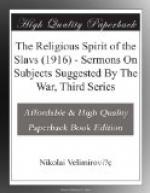The whole history of Christianity is a continual struggle between realities and illusions. All the wars between Christians and pagans, and between Christians themselves, from the time of Christ until our time, had always the same meaning—a struggle between the Christian realities of goodness and saintliness and the pagan illusions of greatness. The present War has the same meaning as all the wars since Christ came until Bismarck. This war was prophesied by Dostojevsky forty years ago. Dostoievsky was the only contemporary man towards whom Nietzsche felt respect and even fear because of his deep thought and clairvoyance. With his genial insight into human nature, Dostojevsky saw clearly the inevitable conflict of the different camps of Europe, whose apparent and hypocritical peace was only a busy preparation for conflict. “Everything will be pulled down,” he said, “especially European pride.” He had also a vision of what will come after this great conflict. “Christ,” he said, “nothing else but Christ Himself will come in the form of panhuman brotherhood and panhuman love.”
YOUR SINS ARE MY SINS.
Love the sinner as well! Do not fly away from the sinners, but go to them without fear. After all—whoever you may be—you are not much better than they are. Try to love the sinners; you will see that it is easier to love those whom you despise than those whom you envy. The old Zosim (from the “Brothers Caramazov”) said, “Brothers, don’t be afraid of the sins of a sinner; but love a sinner also—that is the record of love upon earth.” I know you love St. Peter and St. John, but could you love the sinner Zacchaeeus? You can love the good Samaritan but love, please, the prodigal son also! You love Christ, I am sure; but what about Judas, the seller of Christ? He repented, poor human creature. Why don’t you love him? Dostojevsky—like Tolstoi and Gogol—emphasised two things: first, there is no great man; secondly, there is no worthless man. He described the blackest crimes and the deepest fall and showed that the authors of such crimes are men just as other men, with much good hidden under their sins. Servants and vagabonds, idiots and drunkards, the dirty katorzniki from the Serbian prisons—all those people are God’s sons and daughters, with souls full of fears and hopes, of repentance and longings after good and justice.
Between saintliness and vice there is a bridge, not an abyss. The saintliest and the meanest men have still common ground for brotherhood. Your sins are my sins, my sins are your sins. That is the starting-point for a practical and lucid Christianity. I cannot be clean as long as you are not clean. I cannot be happy as long as you are unhappy. I cannot enter Heaven as long as you are in Hell. What does that mean? It means that you and I are blended together for eternity, and that your effort to separate yourselves from me




